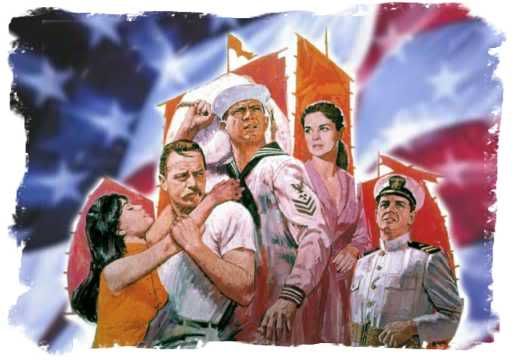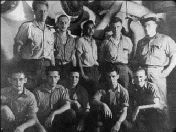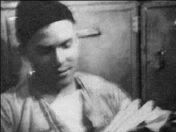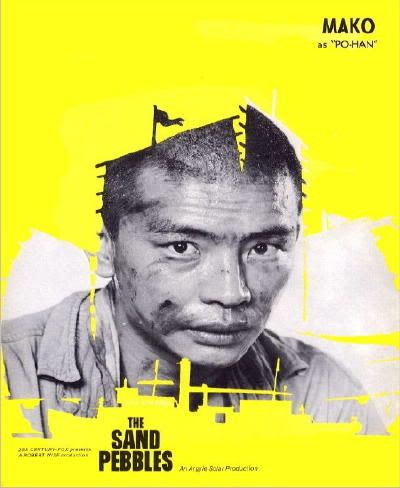Richard McKenna: A Hole Snipe's Writer

Taken from The Sand Pebbles Motion Picture Website - 7 years on the Web!
There are few writers that ever really gave Navy engineers their due. There are writers who give you a very good sense of what it's like to be at sea in the last century, Joseph Conrad, Nicholas Monsarrat, and Herman Wouk come to mind. But no one to my knowledge ever did justice to what it was like to be an engineer, except Richard McKenna. McKenna was a hole snipe. "Hole snipe" translates into someone who's a Navy operating engineer, which in this case means either a machinist mate or a boiler technician (today this would include enginemen and gas turbine technicians, and unlike in McKenna's day there are women in all of the engineering specialties), who spends most of his time in the "hole", which is what the engineering plant on a Navy ship is referred to. In McKenna's case he was a machinist mate, a snipe responsible for maintaining and operating the ship's main engines and its associated auxiliary equipment.McKenna with fellow engineers, and alone. From: Richard McKenna - The Sand Pebbles
McKenna joined the Navy in 1931, during the Depression, to help his family financially. He stayed in the service through World War II and the better part of the Korean War, leaving the service after 22 years in 1953 at the age of 40. Using the G.I. Bill, which was the font of education for many a man coming out of the service after WW II and through the Vietnam War, he went onto the University of North Carolina; this is where he started to write to hone his skills. The book he's most famous for is The Sand Pebbles, which was also made into an excellent movie by the same name released in 1966 and starring Steve McQueen. A collection of McKenna's short stories and essays was put together in The Left-Handed Monkey Wrench: Stories and Essays , and as to be expected engineers are prominent in all of the short stories here. McKenna captured engineers in a way no one I've ever read did, bringing them into my imagination in a way that I, in my 22 years in the Navy and my many years working as and with engineers, had actually experienced them, and came to appreciate and respect them.
McKenna's characters are invariably outsiders, men dedicated to doing it correctly and in turn doing so in spite of what is otherwise expected by peers or society. In one of his short stories, "King's Horsemen", he writes about a ship on station in Chinese waters prior to WW II. A new machinist mate by the name of Hodos comes on board and he immediately stands apart because he doesn't fall in with the bad habits accumulated by a ship and crew far too long on foreign station - they've all gone "local" or "native" by virtue of their distance from the "real" Navy. The engineering plant is run by Dorsey Brown, a man who takes lavish and inappropriate pride in small things, has little true or holistic knowledge about his job and what it entails, and who otherwise encourages sycophants who may either hate or otherwise have little respect for him but are loathe to cross him. Hodos, a junior enlisted man, is totally the opposite of Brown, with simple needs, no care for what others think of him, and a love for the machines he's tasked to maintain and run. In the course of events Hodos undermines Brown, not by words but by actions and competence, and in the end he instills a pride in the engineers and the entire ship's crew by helping the ship do something it should have been able to do at any time had it been maintained properly. In the end, though, Hodos knows he needs to move on - paladins aren't well-suited to the company of mediocrity, especially when the mediocre are in charge.
McKenna took the theme from "King's Horsemen" and fleshed it out into what became "The Sand Pebbles". Hodos became Holman, and Dorsey Brown was replaced by a Chinese overseer of engineroom coolies that did all the actual physical labor on board the U.S.S. San Pablo; the crew of the San Pablo became the Sand Pebbles. In Horsemen Hodos takes under his wing a young enlisted man who's a pariah in the engineroom, teaching him what he needs to know to become a true engineer, not a "show" one like Brown, and imbues in him an appreciation that knowledge is what sets you free. Holman takes a Chinese coolie in tow, teaching him the why of things that before Holman he was only expected to imitate without truly knowing what or why he was doing what he did. In The Sand Pebbles we meet a crueler reality and ending for passing on knowledge, one where freedom isn't the end result as racial intolerance reigns and upsetting "rice bowls" is not to be tolerated. Regardless of the outcome Holman gives the coolie the dignity and respect deserved of any man, for this man was an engineer and therefore deserving an engineer's due, anything else, like race, was incidental and on the whole inconsequential.
Holman is a loner who's standard of excellence rubs many the wrong way, and ultimately in the end he's killed for those standards, and for the love of a missionary woman that the world, and surely her father believes was beyond the likes of a man like Holman - Holman in many ways understood the slights of the coolie from the experiences of his own life, as would have any Sailor prone to a modicum of reflection in this day. Of course a man like Holman is what every man should aspire to, but it's hard to be knowledgeable, confident, AND be able to stand up to mediocrity, ineptitude, or senseless prejudice to do what's right. My guess is that McKenna, as many Sailors in his day, often found himself judged for the uniform he wore and the job he did; he lived through a period when Sailors were still greeted with signs on store doors telling patrons that "Dogs and Sailors are not welcome".
McKenna's characters are all educated men, though not in the traditional sense of the word. Holman and Hodos were both driven to learn, either through books or the correspondence courses the Navy made available to its Sailors (McKenna himself is said to have taken many correspondence courses and has been quoted as saying that he, "... hid books in the nooks and crannies of ships 'the way a squirrel hides acorns.'"), and then through the "hands on" sort of experience essential for an engineer to truly learn and know the equipment he works with day in and day out. What sets McKenna's characters apart is the need to know, and the willingness to work hard to achieve that knowledge, characteristics one would be hard pressed not to believe were part of the makings of the writer himself.
In 1963 the novel "The Sand Pebbles" spent 28 weeks on the NY Times Bestseller list,
and the book earned McKenna the prestigious $10,000 Harper award. But novels are always for a relatively selective audience and an author has a great deal of latitude with regard to risk and what tastes that are appealed to with a book. In this sense the movie "The Sand Pebbles" was a much larger risk. By virtue of the star power emanating from the film with Steve McQueen, Candice Bergen, Richard Attenborough, Mako, and Richard Crenna, the film was guaranteed to get attention, but the ending wasn't the typical American movie fare where the norm was for the hero to overcome adversity and daunting odds and finally get the girl. In one sense it was a movie of the times with a very existential theme, not unlike Paul Newman's 1967 "Cool Hand Luke". (Interestingly enough McQueen was nominated for his first and only Academy Award for this movie, and Newman was nominated for his role as Luke, and both were passed over. It wasn't until Jack Nicholson's R.P. McMurphy in One Flew Over the Cuckoo's Nest (1975) that the great American anti-hero won big Hollywood recognition.) The story was driven by the existentialism of Holman, a man who was reflective and did what he felt was best in whatever situation he found himself in, and who stood by his convictions to the point of risking and finally giving up his own life.
McKenna died at the age of 51 while working on his second book. He was a gifted writer with an extraordinary sensitivity to the lives and pains of men who all too often don't get our attention, no doubt honed from his own experiences during his 22 years in the Navy, and to the difficult questions and situations many of us face in our lives. There were no simple answers in McKenna's world, and of course most important and valuable situations rarely ever demand simple solutions. It's clear from his work that he believed that a man without learning, without convictions, and without the ability and willingness to work hard will rarely make a positive difference in the unfolding theme of a life, and will not be up to the challenges of a life fully lived.
For more information about the movie be sure to visit:
The Sand Pebbles Motion Picture Website
Addendum (7/25/06): Mako, who played Po-han, the Chinese coolie mentioned above, died last Friday (7/21/06). Mako was an excellent actor, his portrayal of Po-han earned him one of two Academy Award nominations, the other to Steve McQueen, for the movie. You can learn more about Mako at Mako, 72: Actor Opened Door for Asian Americans.




3 Comments:
Amen.
Hey, I'm a sailor too. Pass the dittos with one exception. This is in your reference to your mention of racism.
Your belief in the blank slate theory, which says that all races of men were gifted equally, and that all races of men are endowed with the equal drive to pursue their gifts, -if only given the chance, is misleading.
Possibly, I'm being too hard on your use of a word which many now use, if only to advantage for qualifying themselves among a growing world of alleged commonalities.
Which goes to show, that if you say it long enough, you can remove the intuitive truth out of the very ones capable of recognizing it. But they will lose their minds trying to prove just what, if anything that they learned in return. And their creativity, which is deeply rooted in their ablility to perceive and act wisely upon reality, is destroyed.
Yes, I am race conscious, much as you are conscious of predominately associative matters. Have basketball teams become racist? After all, white men have the same genetic makeup to jump and run just as high.
"Where a man will not be judged by the color of his skin, but by the content of his character" -M.L. King.
Let us look at character. But were you to do it with your eyes closed, your choice in certain individuals would have someone calling you a racist, simply on your own preference in character, which is always defined by actions, and the sacrifice to values seen or unseen.
Say what you will, but I know the last of the shouts, once empty of meaning, will continue to use the word which cannot be defied in the "logic" of today's convention: You racist!
Knowing what can and can't happen can very well save us.
Homogenization cannot take place. Respect and decency and borders and cooperation can take place. The most giving, compassionate nation of people ever known to exist on earth will require certain people to sacrifice to this and it always will.
You're right, I believe in the blank slate theory, that indeed all men (and women) are created equal.
I don't believe in intuitive truth as such truth can't possibly be absolutely true. Those who use "intuitive" truth to foundation belief are kidding themselves into thinking that they're dealing with a truth when it's merely what they believe and beliefs have no requirement to be predicated upon any truth. Objective truth is the only truth, and objectively I have no reason to believe that any race of men or women on this planet is any more or less than I am.
But without resorting to objective truth in this case as this would require references, etc., let's use "intuition". In this movie Po Han was racially inferior by virtue of the determination of the men who he worked with who themselves would have been treated as social inferiors in the society they came from in the U.S. at the time. Indeed, the movie makes that very point in the relationship between Holman and the missionary woman, a woman clearly believed by everyone but themselves (though Holman had his doubts) to be above him in station. The fact is that Po Han's predecessors running around this country right now dominate the upper tiers of learning institutions, i.e. they are consistently the better prepared and performing students in our schools. So how the Po Hans of the world went from being lowly, inferior coolies 100 years ago to what they most certainly are now in this society, and their own, is clearly a reflection of racism in the past and blank slates being given an opportunity to excel today.
Differences between men and women are cultural, not racial. Basketball is no more racist than boxing, though both are populated by blacks in large numbers. That's due to cultural influences, for the same reason that boxing was by and large an Irish endeavor 100 years ago in this country. There are certainly large cultural differences between people of different races, but that does not speak to inate ability or capability where, all the evidence that I see anyway, tells me we're all equal.
"Homogenization" is happening all over the place, in this country especially. Can it "save" us? Well likely not as I doubt it's happening fast enough. Being passionate or decent surely are virtues to be encouraged and practiced, but being exclusionary on the basis solely of race falls into neither category and in fact is quite antithetical to either.
So James,
Are you saying Everyone is equal to Einstein?
Post a Comment
<< Home